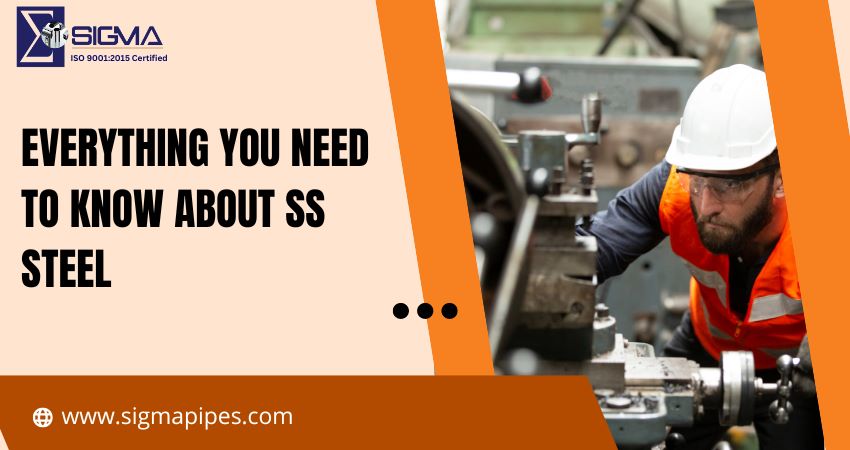Stainless steel, often referred to as SS steel, is a versatile and popular material known for its durability, resistance to corrosion, and aesthetic appeal. For the past decade, their usage has become extensive. In today’s blog, Sigma Pipes will be telling you everything. So, get, set and start reading:
- Composition
SS is primarily composed of iron, along with varying amounts of chromium, nickel, and other alloying elements. The exact composition and ratios of these elements determine the specific properties of the SS grade.
- Temperature and Corrosion Resistance
It exhibits excellent resistance to high and low temperatures, making it suitable for use in extreme temperature environments. Some SS grades can withstand temperatures up to 1,200°C (2,192°F) without significant loss of strength or corrosion resistance. Another most notable characteristic of SS is its resistance to corrosion. The presence of chromium forms a passive protective layer on the surface of the steel, which prevents rust and corrosion, making it suitable for a wide range of applications.
- Grades and Types
These steel pipes come in numerous grades and types, each with its own unique properties and applications. Common grades include 304 (A2), 316 (A4), and 430 SS. These grades differ in their chemical composition, corrosion resistance, strength, and heat resistance. Generally, SS can be classified into two categories: magnetic and non-magnetic. SS variants such as the common grade 304, are non-magnetic. Ferritic and martensitic, such as grade 430, are magnetic. The magnetic properties can be useful in certain applications, such as magnetic separators or magnetic tools.
- Applications
SS is widely used in various industries and applications due to its desirable properties. It is commonly found in kitchen appliances, cookware, utensils, medical equipment, automotive components, construction materials, architectural structures, and more. SS can be finished in different ways to achieve desired appearances and textures. Common finishes include brushed, polished, satin, and matte finishes, each providing a distinct aesthetic and level of reflectivity. SS is appreciated for its sleek, modern appearance and versatility. Its clean and reflective surface adds an aesthetic appeal to both functional and decorative applications.
- Maintenance
While SS is known for its corrosion resistance, it still requires proper care and maintenance to maintain its appearance and performance. Regular cleaning with mild soap or SS cleaners and avoiding harsh chemicals or abrasive materials can help preserve its integrity.
- Recyclability
SS is highly recyclable and has a long life cycle. It can be melted down and reused without any loss in quality, making it an environmentally friendly material choice.
- Strength and durability
Stainless steel offers excellent strength and durability, making it suitable for applications that require resistance to heavy loads, high temperatures, or harsh environments. It has a high tensile strength and can retain its properties even in extreme conditions. Also, it is known for its high strength-to-weight ratio, making it a preferred material in applications where both strength and lightness are crucial. It is also a versatile material that can be easily fabricated into various shapes, sizes, and forms, including sheets, plates, bars, tubes, and wires.
- Hygienic properties.
SS is favored in industries that require strict hygiene standards, such as the food and beverage, pharmaceutical, and healthcare sectors. Its smooth, non-porous surface makes it easy to clean, and it is resistant to bacterial growth, making it an ideal choice for applications where cleanliness is paramount.
- Cost.
The cost of SS steel can vary depending on factors such as grade, finish, size, and market demand. Some high-end and specialized grades can be relatively expensive compared to more common grades. However, its long lifespan, low maintenance requirements, and recyclability can contribute to cost savings over its lifecycle.
It’s important to note that there are many different grades and types of SS, each with its own specific properties and applications. The choice of SS grade depends on the intended use and environmental conditions it will be exposed. Consulting with experts or referring to specific industry standards can provide more detailed information on selecting the right SS grade for a particular application.













